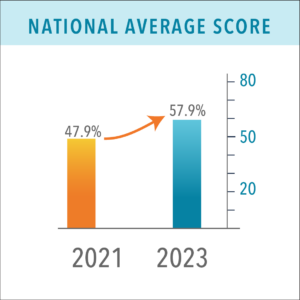Friday Facts is a new series in which we will present a data point or bit of information from the latest set (2023) of Report Cards on Child and Youth Sex Trafficking. On every Friday this year, we will feature a fact from one state (or Washington, D.C.). During the course of 2024, we will walk through, in random order, all states plus the nation’s capital. However, we will start this series with a fact about the whole of the United States.
Facts for the U.S. as a whole:
- The national average grade on the Report Cards, out of a total possible 100 points, is 57.9. On Shared Hope’s scale of letter grades, this is an F, the lowest possible grade.
- 32 states – the majority – have a score of 60 or lower, which is what accounts for a low national average.
- However, over the last two years, the national average has risen an impressive 10 points (from 47.9).

See more about the overall U.S. grade on Shared Hope’s Report Cards on Child and Youth Sex Trafficking.






